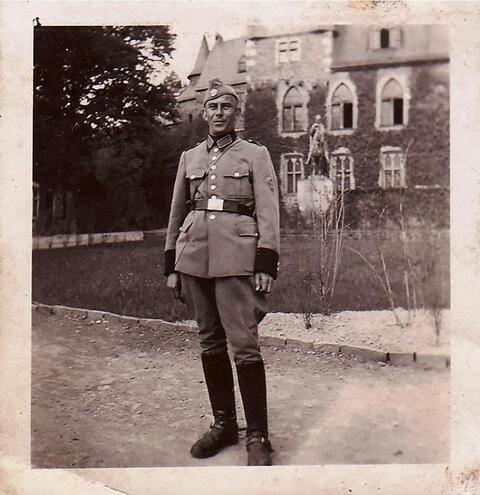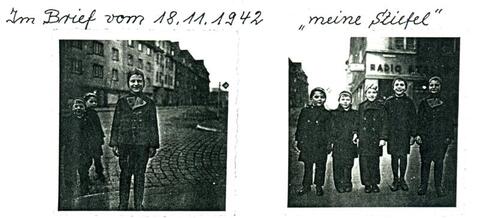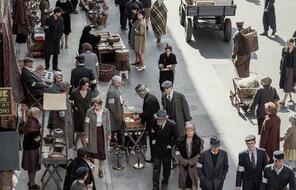Reaping the Benefits of War
At a Glance
Language
English — USSubject
- History
- The Holocaust
As the German Reich expanded throughout Europe in the first two years of World War II, the German government began to exploit the resources of its newly acquired empire to meet the needs of the German military and the citizens at home. Wars often cause shortages of goods and resources that are usually available to governments and individuals in times of peace. As supplies become scarce, governments must send them first to the military and soldiers, which often leaves civilians at home to face considerable hardship, even hunger. Therefore, in order to supply its military and also to maintain support from its citizens, Germany confiscated large portions of the food, raw materials, and manufactured goods produced in the newly conquered territories.
German leaders also encouraged soldiers to send food and other goods home from the countries where they were stationed. New German policies were designed to make buying goods in conquered countries as easy and inexpensive as possible for soldiers. First, a high exchange rate was set for the Reichsmark against other currencies, which increased the amount of goods that could be bought in occupied countries with German money. Then, German soldiers’ pay was increased and limits on how much they could ship or transport home to their families in Germany were abolished. In order to afford the pay raises, the Nazis forced the occupied countries to pay for the cost of the German occupation, a cost that Germany alone would determine.
These policies led to massive shipments of foreign goods from soldiers to their families in Germany:
The letters written by German soldiers are full of reports and promises of goods, looted or purchased with their German Reichsmarks, being sent to their families in Germany. . . . Mothers and wives sent money in the post to their sons in France and Belgium, Latvia and Greece, intended for them to buy supplies to take or send home. Soldiers seldom returned to Germany without carrying bags and suitcases of presents, purchased or purloined. After the regime lifted restrictions on how much could be taken or sent home in this way, the number of packages from France to Germany by military post soon ran at more than three million a month. 1
Soldiers not only bought goods but also plundered, or stole, items to send home. They took possessions from other countries’ soldiers and civilians alike, living or dead. Kurt Dreyer, a German soldier, sent the following letter to his wife and son in Germany, accompanied by a pair of boots:
Krasnystaw, 18 November 1942
My dear Mommy, my dear Hans-Jürgen,
Thank you very much for your lovely letters of 10, 11 and 14 November and the many newspapers, all of which I received yesterday because the mail was delayed again. What is it going to be like in winter? All the trains here are constantly delayed by hours. The old Polish tempo still reigns here. I haven’t experienced anything in these days and haven’t done much aside from one day of watch. A large number of comrades went out and arrested quite a few members of the Polish resistance movement, but I also don’t think that they would have undertaken anything against us. The days of rest will probably be over again soon, though, and I think that we’ll already be heading out again tomorrow. . . . On Saturday I took the long boots off of a dead Jewish woman, approximately size 35. Maybe the boy can wear them if new heels are put under them. They are very good, high boots. Tommy [nickname for the British military] is probably leaving you alone a bit; he has enough to do in Africa. We should hope that he soon obtains a powerful defeat there. We’re following further events in Africa with great excitement. You can now expect my vacation in mid-January if there’s not too much snow by then so that the trains can still come back. I’ll have a lot to tell then. I send many heartfelt greetings to Trudi and thank the Becker family for their regards that were passed on. My best wishes to both of you for a healthy reunion soon at home.
From your loving
Pappi [Daddy] 2
Dreyer's family wrote back and sent him a photograph of young Hans-Jürgen wearing the boots his father had sent.
Historian Götz Aly writes that the massive transfer of goods, and therefore wealth, back to Germany from the occupied countries increased support for the war from German soldiers and their families alike:
The zeal of whole divisions of bargain hunters, family providers, and insatiable opportunists considerably alleviated the hardships of war. It fostered a sense of material connection between the battlefield and the home front. The calculated policy of allowing soldiers to personally enrich themselves at the expense of foreign peoples gave rise to the feeling that their interests were being watched over from above and that small oases of pleasure were possible within the larger war. “Do you know,” [soldier Heinrich] Böll wrote to his wife, “how happy it makes me to be able to send you something?” On another occasion, he rhapsodized: “It was the source of truly indescribable joy for me to supply you with butter.” . . . The Bölls—a Catholic family disinclined to sympathize with Nazism—were basically satisfied with their lot. Their money wasn’t sitting around uselessly. It was being transformed in France . . . into practical necessities and luxury items. 3
- 1Richard J. Evans, The Third Reich at War (New York: Penguin Press, 2009), 334.
- 2Letter by Kurt Dreyer, November 18, 1942, Geschichtsort Villa ten Hompel Münster, EV Geschichte am Jürgensplatz Düsseldorf, translated by Anthony Cantor.
- 3Götz Aly, Hitler's Beneficiaries: Plunder, Racial War, and the Nazi Welfare State (New York: Metropolitan Books, 2007), 110.
Kurt Dreyer during World War II

Kurt Dreyer during World War II
Kurt Dreyer, a German soldier who fought in World War II.
Kurt Dreyer's Son

Kurt Dreyer's Son
Kurt Dreyer’s son wears the boots his father, a German soldier, sent him from Poland during World War II. Meine stiefel means “my boots.”
Connection Questions
- How did the German government make it easier for soldiers to buy and ship foreign goods to their families in Germany? Why did the government want to encourage such purchases?
- What did Kurt Dreyer report to his family about his experience? Where did Dreyer get the boots included with the letter? What did his family do with them? How might packages like the one Dreyer sent to his family have affected the attitudes of German civilians toward the war?
- Historian Götz Aly writes that “everyday people, acting on ordinary calculations of self-interest, could become complicit in a government-driven program of larcenous genocide.” 4 What does it mean to be complicit? Do you agree with Aly? How does this reading suggest that “everyday people” might become complicit in crimes committed by their government?
- 4Götz Aly, Hitler's Beneficiaries: Plunder, Racial War, and the Nazi Welfare State (New York: Metropolitan Books, 2007), 8.
How to Cite This Reading
Facing History & Ourselves, "Reaping the Benefits of War," last updated August 2, 2016.








